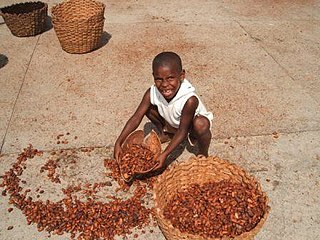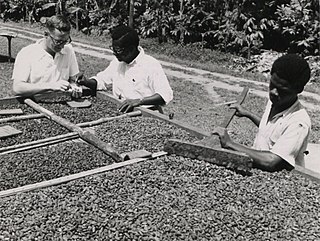
Chocolate or cocoa is a food made from roasted and ground cocoa seed kernels that is available as a liquid, solid, or paste, either on its own or as a flavoring agent in other foods. Cocoa has been consumed in some form for at least 5,300 years starting with the Mayo-Chinchipe culture in what is present-day Ecuador. Later Mesoamerican civilizations also consumed chocolate beverages, and it was introduced to Europe in the 16th century.

The cocoa bean, also known simply as cocoa or cacao, is the dried and fully fermented seed of Theobroma cacao, the cacao tree, from which cocoa solids and cocoa butter can be extracted. Cacao trees are native to the Amazon rainforest. They are the basis of chocolate and Mesoamerican foods including tejate, an indigenous Mexican drink.

The Hershey Company, often called just Hershey or Hershey's, is an American multinational confectionery company headquartered in Hershey, Pennsylvania, United States, which is also home to Hersheypark and Hershey's Chocolate World. The Hershey Company is one of the largest chocolate manufacturers in the world; it also manufactures baked products, such as cookies and cakes, and sells beverages like milkshakes, as well as other products. The Hershey Company was founded by Milton S. Hershey in 1894 as the Hershey Chocolate Company, originally established as a subsidiary of his Lancaster Caramel Company. The Hershey Trust Company owns a minority stake but retains a majority of the voting power within the company.
Mars, Incorporated is an American multinational manufacturer of confectionery, pet food, and other food products and a provider of animal care services, with US$45 billion in annual sales in 2022; that year Forbes ranked the company as the fourth-largest privately held company in the United States. Headquartered in McLean, Virginia, the company is entirely owned by the Mars family. Mars operates in four business segments around the world: Mars Wrigley Confectionery, Petcare, Food, and MARS Edge, the company's life sciences division.

The Harkin–Engel Protocol, sometimes referred to as the Cocoa Protocol, is an international agreement aimed at ending the worst forms of child labor and forced labor in the production of cocoa, the main ingredient in chocolate. The protocol was negotiated by U.S. Senator Tom Harkin and U.S. Representative Eliot Engel in response to a documentary and multiple articles in 2000 and 2001 reporting widespread child slavery and child trafficking in the production of cocoa. The protocol was signed in September 2001. Joint Statements in 2001, 2005 and 2008 and a Joint Declaration in 2010 extended the commitment to address the problem.

Child labour is a recurring issue in cocoa production. Ivory Coast and Ghana, together produce nearly 60% of the world's cocoa each year. During the 2018/19 cocoa-growing season, research commissioned by the U.S. Department of Labor was conducted by NORC at the University of Chicago in these two countries and found that 1.48 million children are engaged in hazardous work on cocoa farms including working with sharp tools and agricultural chemicals and carrying heavy loads. That number of children is significant, representing 43 percent of all children living in agricultural households in cocoa growing areas. During the same period cocoa production in Cote d’Ivoire and Ghana increased 62 percent while the prevalence of child labour in cocoa production among all agricultural households increased 14 percentage points. Attention on this subject has focused on West Africa, which collectively supplies 69% of the world's cocoa, and Côte d'Ivoire, supplying 35%, in particular.
"Big Chocolate" is a business term assigned to multi-national chocolate food producers, akin to the terms "Big Oil," "Big Pharma," and "Big Tobacco".

Côte d'Or is a producer of Belgian chocolate, owned by Mondelez International. Côte d'Or was founded in 1883 by Charles Neuhaus in Schaerbeek, Belgium, a chocolate manufacturer who used the name "Côte d'Or" referring to the old name of contemporary Ghana, the source of many of the cacao beans used in chocolate manufacturing.

Olam International is an agri-business company, operating in 60 countries and supplying food and industrial raw materials to over 20,900 customers worldwide, placing them among the world's largest suppliers of cocoa beans, coffee, cotton and rice. Its value chain includes farming, origination, processing and distribution operations, child labor, and allegedly even child slavery.
Barry Callebaut AG is a Swiss-Belgian cocoa processor and chocolate manufacturer, with an average annual production of 2.3 million tonnes of cocoa & chocolate . It was created in 1996 through the merging of the French company Cacao Barry and the Belgian chocolate producer Callebaut. It is currently based in Zürich, Switzerland, and operates in over 30 countries worldwide. It was created in its present form by Klaus Johann Jacobs.

Ivory Coast leads the world in production and export of the cocoa beans used in the manufacture of chocolate, as of 2012, supplying 38% of cocoa produced in the world. West Africa collectively supplies two thirds of the world's cocoa crop, with Ivory Coast leading production at 1.8 million tonnes as of 2017, and nearby Ghana, Nigeria, Cameroon and Togo producing additional 1.55 million tonnes. Ivory Coast overtook Ghana as the world's leading producer of cocoa beans in 1978, and today is highly dependent on the crop, which accounts for 40% of national export income. The primary non-African competitor of Ivory Coast is Indonesia, which went from having almost nonexistent domestic cocoa industry in the 1970s to becoming one of the largest producers in the market by the early 2000s. According to the UN FAO, Indonesia overtook Ghana and became the second-largest producer worldwide in 2006. The World Cocoa Foundation provides significantly lower figures for Indonesia, but concurs that it is the largest producer of cocoa beans outside of West Africa. Large chocolate producers such as Cadbury, Hershey's, and Nestle buy Ivorian cocoa futures and options through Euronext whereby world prices are set.
This article addresses various criticisms of Cargill Inc, a privately held agribusiness multinational giant with operations in 70 countries and its headquarters in Minneapolis, Minnesota, in the United States. Cargill Inc has been owned by the Cargill family for 154 years. It is the largest privately-owned corporation in the United States, with an annual revenue of $113.5 billion in 2019.
The environmental impact of cocoa production includes deforestation, soil contamination, and herbicide resistance. The majority of cocoa farms are now located in Côte d'Ivoire and Ghana.

Fair trade cocoa is an agricultural product harvested from a cocoa tree using a certified process which is followed by cocoa farmers, buyers, and chocolate manufacturers, and is designed to create sustainable incomes for farmers and their families. Companies that use fair trade certified cocoa to create products can advertise that they are contributing to social, economic, and environmental sustainability in agriculture.
Mondelez International, Inc., styled as Mondelēz International, is an American multinational confectionery, food, holding, beverage and snack food company based in Chicago. Mondelez has an annual revenue of about $26.5 billion and operates in approximately 160 countries. It ranked No. 108 in the 2021 Fortune 500 list of the largest United States corporations by total revenue.

Ghana is the second-largest exporter of cocoa beans in the world, after Ivory Coast. Ghana's cocoa cultivation, however, is noted within the developing world to be one of the most modelled commodities and valuables.

The International Cocoa Initiative (ICI) is a Geneva-based nonprofit funded by major chocolate makers that focuses on addressing child labour in cocoa production in West Africa. ICI works with communities, farmers, unions, the cocoa and chocolate industry, civil society and national governments in cocoa-producing countries to improve the lives of children involved in cocoa production. The secretariat of the International Cocoa Initiative is in Geneva, Switzerland. The organisation has two national offices in Abidjan and Accra.
Regenerative cacao is defined as cacao that is produced on a farm that employs regenerative agriculture and agroforestry methods. It is most closely associated with the Ecuadorian chocolate company To’ak, the organic food supplier Navitas, the rainforest conservation organization TMA, and the social-agricultural enterprise Terra Genesis. Cacao is the raw material that is used to produce chocolate.
Nestlé has been involved in a significant number of controversies and has been criticized a number of times for its business practices. Nestlé is the largest publicly held food company in the world, owning over 2000 different brands. Since the 1970s, the criticism of Nestlé increased, with criticism leveled at the company over marketing, slavery, product safety, and more.
The Côte d'Ivoire–Ghana Cocoa Initiative (CIGCI) is an intergovernmental organisation of cocoa-producing countries. It was founded in 2018 by its two eponymous member countries, Côte d'Ivoire and Ghana, to jointly influence global cocoa prices and the chocolate market. Its proclaimed goal is to increase the revenues of cocoa farmers in its member countries in a sustainable manner. Critics have described the organisation as a "cocoa cartel" and nicknamed it "COPEC", a reference to the oil cartel OPEC.








